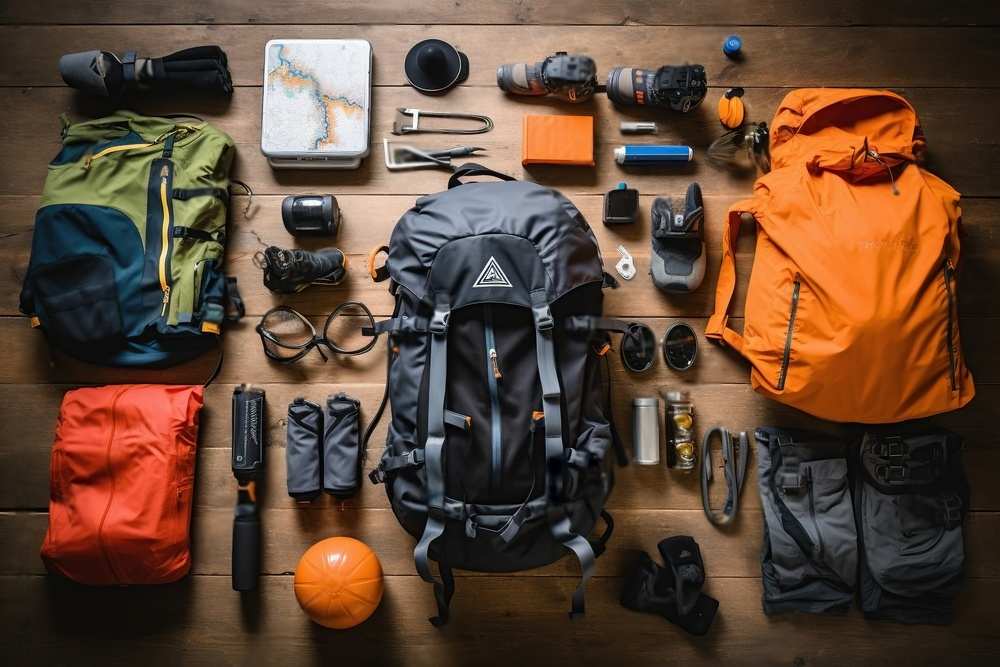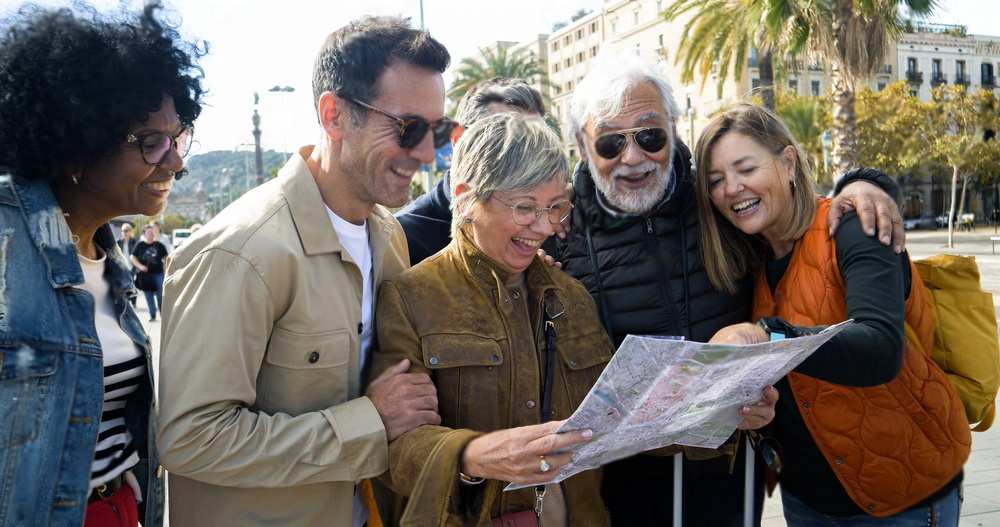Are you interested in travelling the world, but if you think of travel planning for beginners, all you can see is a nightmare before your eyes? In this case, an article about travel planning just for you and me.Travelling is probably the most life-changing and rewarding experience that can be pushed to the next level only by having children. But the reality is that the thought of planning your first trip can be paralysing. When you start, it’s fun and fascinating, but then you fall into an abyss of doubts – is it too expensive? Am I too old for it? Will I even remember it afterwards?
That’s why we created this article to help you plan your first trip. Step by step. So, are you ready to plan a fun memory from your bucket list? If so, you’ve come to the right place.
Define Your Travel Goals and Destination
The first step in planning your travel adventure is to define your goals. Then, choose a destination that fits your interests and budget. Ask yourself what makes you want to travel. Is it relaxation, adventure, culture, or something else? Once you’ve identified your motivation, research destinations that cater to your interests.
For example, if you’re seeking adventure, consider destinations like New Zealand for its stunning landscapes and outdoor activities, or Costa Rica for its diverse wildlife and eco-tourism opportunities. If you’re more interested in cultural immersion, cities like Tokyo, Marrakech, or Havana offer rich histories and vibrant traditions to explore.
Additionally, consider the best time to visit your chosen destination based on weather, events, and peak seasons. Some places may be cheaper or less crowded during shoulder seasons. Others may offer unique experiences during specific times, such as festivals or cultural celebrations.
For instance, if you’re planning a trip to Bali, Indonesia, the dry season from April to September is generally considered the best time to visit, with lower humidity and less rainfall. But, if you want to experience the vibrant Balinese culture, you should visit during one of the island’s many festivals. For example, the Galungan and Kuningan celebrations or the Bali Arts Festival.
“The world is a book, and those who do not travel read only one page.” – Saint Augustine
Travel Style and Preferences
Another important factor is your travel style. Consider it when defining your travel goals. Are you a backpacker looking for cheap adventures? Or, do you prefer a more luxurious experience? Do you enjoy group tours or prefer to explore independently? Understanding your travel style will help you plan an adventure that aligns with your preferences and budget.
For example, if you’re a solo backpacker, you might consider staying in hostels or using Couchsurfing to save money and meet fellow travelers. If you’re traveling with a family, you might prefer the convenience and amenities of a resort or vacation rental.
Create a Realistic Budget
Once you’ve decided on your destination, it’s time to create a realistic budget. Start by estimating the costs for flights, accommodation, transportation, food, and activities. Look for ways to save money, such as booking budget airlines, staying in hostels or Airbnbs, and using local transportation.
Here’s an example of a basic budget breakdown for a 10-day trip to Bangkok, Thailand:
| Expense | Cost (USD) |
| Flights (roundtrip) | $600 |
| Accommodation (hostels) | $150 |
| Local Transportation | $50 |
| Food | $200 |
| Activities/Attractions | $150 |
| Miscellaneous | $100 |
| Total | $1,250 |
Don’t forget to factor in additional expenses like travel insurance, visas, and vaccinations (if required). It’s also a good idea to set aside an emergency fund for unexpected costs or emergencies.
Budgeting Tips

To help you create a realistic budget, here are some tips:
- Use travel budgeting apps or websites like Trail Wallet or Budget Your Trip to estimate costs for your destination.
- Look for deals and discounts on flights, accommodation, and activities. You can do this by signing up for travel newsletters or following travel bloggers and influencers.
- Consider alternative accommodation options like Couchsurfing, Trusted Housesitters, or WorkAway to save on accommodation costs.
- Eat like a local by visiting markets, street food stalls, and local restaurants instead of touristy areas.
- Use public transportation or walk whenever possible to save on transportation costs.
Remember, it’s better to overestimate your budget than to run out of funds during your trip. Having a realistic budget will help you enjoy your adventure without worrying about finances.
Plan Your Itinerary
With your destination and budget in mind, it’s time to plan your itinerary. Start by deciding on the duration of your trip and prioritizing the must-see attractions and experiences. Balance your itinerary with a mix of activities and downtime to avoid burnout.
For example, if you’re visiting Rome, Italy, your itinerary might include:
- Day 1: Arrive in Rome, check into accommodation
- Day 2: Visit the Colosseum, Roman Forum, and Palatine Hill
- Day 3: Explore the Vatican City (St. Peter’s Basilica, Sistine Chapel, Vatican Museums)
- Day 4: Relax in Villa Borghese gardens, visit the Trevi Fountain and Spanish Steps
- Day 5: Day trip to Tivoli (Villa d’Este and Hadrian’s Villa)
- Day 6: Depart Rome
Don’t forget to consider travel between destinations. You can take flights, trains, or buses. Leave room for flexibility and spontaneity in your itinerary, as unexpected opportunities or changes may arise during your trip.
Itinerary Planning Tips
When planning your itinerary, keep these tips in mind:
- Research the best attractions and experiences in your destination. Base your choices on your interests.
- Use online tools like Google Maps or TripAdvisor to plan your daily routes and estimate travel times between attractions.
- Consider purchasing a city pass or attraction bundle to save money on admission fees.
- Schedule downtime or rest days, especially if you’re traveling to multiple destinations or engaging in physically demanding activities.
- Leave room for spontaneity and flexibility in your itinerary. This allows for unexpected discoveries or plan changes.
- If you’re traveling with a group, involve everyone in the itinerary planning process to ensure everyone’s interests and preferences are considered.
Remember, a good plan can help you make the most of your time. It ensures you don’t miss the experiences that matter most to you.
Book Your Flights and Accommodation

With your itinerary in place, it’s time to book your flights and accommodation. Compare prices across different travel booking sites like Expedia, Kayak, or Skyscanner to find the best deals on flights and hotels.
Look for deals and discounts. Also, consider other accommodation options like Airbnb, hostels, or camping. These options can save money. Book early for popular places and peak times. Do this to ensure availability and maybe lower prices.
Flight Booking Tips
When booking flights, keep these tips in mind:
- Be flexible with your travel dates to find the best deals.
- Consider flying on weekdays or red-eye flights, which are often cheaper than weekend or daytime flights.
- Use flight search engines like Google Flights or Skyscanner to compare prices across multiple airlines and dates.
- Sign up for airline newsletters and follow them on social media to stay informed about sales and promotions.
- Consider booking one-way flights or open-jaw tickets (flying into one city and out of another) if it’s more cost-effective.
Accommodation Booking Tips
When booking accommodation, consider these tips:
- Use filters on booking sites to narrow down your options based on your preferences and budget.
- Read reviews and check ratings to ensure you’re booking a reputable and comfortable place to stay.
- Look for accommodation with amenities that match your travel style. For example, look for kitchenettes for self-catering or on-site laundry for longer stays.
- Consider booking directly with the accommodation provider. This will help you avoid third-party fees or commission.
- If you’re traveling during peak season, book your accommodation well in advance to secure the best rates and availability.
Prepare for Your Trip
As your travel date approaches, it’s essential to prepare for your trip. Obtain necessary travel documents, such as a passport and visas (if required), and research entry and exit requirements for your destination.
Get travel insurance. Understand its coverage. It includes medical emergencies, trip cancellations, and lost or stolen belongings. Learn simple phrases in the local language. They will help you talk to locals and navigate the area.
Packing smart and light is also crucial. Create a packing list and prioritize versatile, lightweight clothing and essentials. Don’t forget to pack any necessary medications, chargers, and adapters for your electronics.
Travel Documents and Requirements
Before you start your adventure, make sure you have the following travel documents. Also, ensure you meet the necessary requirements:
- Valid passport: Check the expiration date and ensure your passport is valid for at least six months beyond your planned return date.
- Visas: Research visa requirements for your destination and apply for any necessary visas well in advance.
- Get comprehensive travel insurance. It should cover medical emergencies, trip cancellations, and lost or stolen belongings.
- Check required vaccinations for your trip. Get them early.
- Research any specific entry or exit rules. This includes things like COVID-19 testing or quarantine rules for your destination.
Packing Tips
Packing smart and light can make your travel experience more enjoyable and stress-free. Here are some packing tips:
- Create a packing list and prioritize versatile, lightweight clothing that can be mixed and matched.
- Pack a combination of neutral and accent colors to create multiple outfits with fewer items.
- Choose fabrics that are wrinkle-resistant, quick-drying, and easy to care for.
- Pack a small first-aid kit with essential medications, bandages, and over-the-counter remedies.
- Bring copies of important documents. These include your passport, travel insurance, and emergency contacts.
- Pack a universal power adapter and a portable charger for your electronic devices.
- Consider packing a small travel towel, earplugs, and an eye mask for added comfort.
- If you’re checking luggage, pack a change of clothes and essential items in your carry-on bag in case your checked luggage is delayed or lost.
Remember, you can always purchase items you forget or need while traveling, so don’t overpack and weigh yourself down unnecessarily.
Stay Safe and Connected

Safety should be a top priority when traveling, especially if you’re a beginner. Register with your embassy or government’s travel advisory program, which can provide updates on safety conditions and assist you in case of an emergency.
Research local laws, customs, and norms. This will help you avoid accidentally offending people or risking harm. Keep copies of important documents and emergency contacts, both physical and digital, in case you need them.
Consider getting a local SIM card or an international data plan. They will keep you connected and let you use maps, translation apps, and other helpful resources while on the go. Share your itinerary with family or friends back home, so they know your whereabouts and can contact you if necessary.
Safety Tips
To ensure a safe and enjoyable travel experience, follow these safety tips:
- Research your destination and familiarize yourself with potential risks or safety concerns.
- Register with your embassy or government’s travel advisory program, such as the Smart Traveler Enrollment Program (STEP) for U.S. citizens.
- Learn about local laws, customs, and cultural norms to avoid offending or putting yourself in harm’s way.
- Keep copies of important documents, such as your passport, travel insurance, and emergency contacts, in a secure location.
- Be cautious with your personal belongings and avoid carrying large amounts of cash or valuables.
- Use trusted transportation services, such as licensed taxis or ride-sharing apps, especially at night or in unfamiliar areas.
- Trust your instincts and avoid situations or areas that make you feel uncomfortable or unsafe.
Staying Connected
Staying connected while traveling can help you access important information, navigate unfamiliar areas, and stay in touch with loved ones back home. Here are some tips for staying connected:
- Consider getting a local SIM card or an international data plan for your smartphone to access maps, translation apps, and other useful resources.
- Download offline maps or translation apps before your trip to ensure access even without an internet connection.
- Research and bookmark useful websites or apps for your destination, such as transportation apps, restaurant guides, or emergency services.
- Share your itinerary with family or friends back home, and provide them with contact information for your accommodation and emergency contacts.
- Follow travel advisories and updates from your embassy or government’s travel advisory program for any safety or security updates.
Stay informed and connected. This will help you navigate your travel adventure with more confidence and safety.
Embrace the Adventure
Finally, the most important aspect of travel planning is to embrace the adventure! Be open to new experiences and cultural differences, and respect local customs and traditions.
Interact with locals to gain a deeper understanding of the destination and its people. Consider taking a walking tour or participating in a cultural exchange program to immerse yourself in the local way of life.
Keep a travel journal or blog to document your memories, experiences, and reflections. Stay flexible and enjoy the journey, as unexpected detours or challenges can often lead to the most memorable moments.
Immerse Yourself in Local Culture
One of the most rewarding aspects of travel is the opportunity to immerse yourself in local cultures and traditions. Here are some ways to embrace cultural immersion:
- Learn a few basic phrases in the local language to show respect and appreciation for the culture.
- Attend local festivals, celebrations, or events to experience the destination’s traditions firsthand.
- Try local cuisine and visit markets or food stalls frequented by locals to sample authentic dishes.
- Participate in cultural activities or workshops, such as cooking classes, dance lessons, or artisan demonstrations.
- Engage with locals by striking up conversations, asking questions, and showing genuine interest in their way of life.
- Respect local customs and dress codes, especially when visiting religious sites or traditional communities.
By embracing cultural immersion, you’ll not only create more meaningful connections and memories but also gain a deeper appreciation for the diversity of our world.
Embrace Spontaneity and Flexibility
While planning is essential, it’s also important to embrace spontaneity and flexibility during your travel adventure. Unexpected opportunities, detours, or challenges can often lead to the most memorable experiences.
- Leave room in your itinerary for spontaneous activities or discoveries.
- Be open to changing plans or adjusting your schedule based on local recommendations or unforeseen circumstances.
- Embrace getting lost or taking a wrong turn – it might lead you to a hidden gem or a unique experience.
- Say “yes” to invitations or opportunities that align with your interests and comfort level.
- Maintain a positive attitude and a sense of humor when faced with unexpected challenges or setbacks.
By embracing spontaneity and flexibility, you’ll not only reduce stress and enjoy your adventure more fully, but you’ll also create opportunities for truly unique and unforgettable experiences.
Conclusion Paragraph:
Above all, planning your first trip can feel daunting. But if you follow these steps, you’ll be well on your way to a trip of a lifetime. Start early. Do your research. And be brave. Be bold. Plan well. Be bold. Then come home and tell us about it. We’ll listen. So what are you waiting for? Planning the trip of a lifetime? Then let’s get started.
